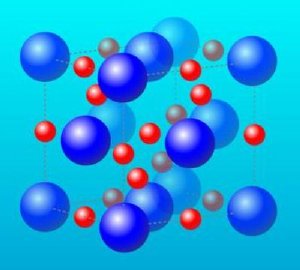Aug 3 2009
Hydrogen, the most common element in the universe, is normally an insulating gas, but at high pressures it may turn into a superconductor. Now, scientists at the Carnegie Institution in Washington D.C., US, have discovered a hydrogen-based compound that could be helpful in the search for metallic and superconducting forms of hydrogen. The results are reported in Physical Review Letters and highlighted in the August 3rd issue of APS's on-line journal Physics.
 The hydrogen based compound SiH4(H2)2 may be a useful system in which to explore metallic hydrogen. Credit: Image copyright American Physical Society [Illustration: Alan Stonebraker after T. Strobel et al.]
The hydrogen based compound SiH4(H2)2 may be a useful system in which to explore metallic hydrogen. Credit: Image copyright American Physical Society [Illustration: Alan Stonebraker after T. Strobel et al.]
Hydrogen is the simplest of the elements: it contains one proton and one neutron. Because hydrogen is so light, quantum theory says that it will have a significant energy even when it is cooled to very low temperatures. This is why hydrogen only solidifies at just 14 degrees above absolute zero.
Scientists predicted that it should be possible to form a metal from hydrogen, but the pressure that would be required to do so - some 4 million atmospheres - exceeds that at the center of the earth. By forming compounds of hydrogen with another element like Si it is possible to make fairly dense forms of hydrogen that do become metals at more experimentally accessible pressures. In fact, SiH4 becomes a metal at about one tenth the pressure needed to make pure hydrogen metallic, and a superconductor at about 1 million atmospheres.
In their paper, Timothy Strobel, Maddury Somayazulu, and Russell Hemley present extensive high-pressure experiments on a mixture of SiH4 and H2. At pressures of only ~ 7.5 GPa, they discovered a new compound - SiH4(H2)2 - in which the hydrogen bonds are unusually weak and which may become a metal at higher pressures.
The ultimate goal of such studies is to generate conditions under which hydrogen effectively becomes metallic, and hopefully superconducting, at pressures lower than those required for pure solid hydrogen.